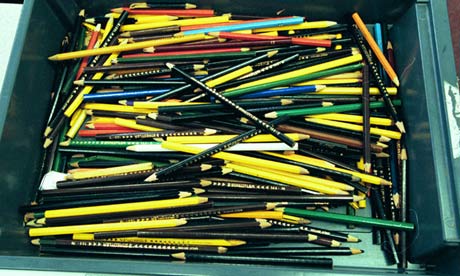A Brit in the Bronx: do charter schools really work in the US?
Brit-born teacher Anna Bailey is working in her third charter school - but she can't make up her mind if longer hours and less rights for teachers really deliver results

Regardless of who is running a school, focusing on just making a profit impacts on available resources. Students at Anna Bailey's school are using crayon stubs as they've run out of pencils. Photograph: Frank Baron for the Guardian
I was just on the west coast and turned on the local news in time to hear a reporter say that all the problems in public education in his area were about to be solved - hurray - by considerably extending the number of classroom observations of all teachers. Feel free to indulge in hollow laughter. But really, isn't it wonderful that there are so many ways to fixschools? You can tear everything up and start again, fiddle around at the edges with whatever system you already have and/or call in lots of consultants to transfer their totally relevant skill sets, learned in factories, offices, shops and possibly even circuses, zoos and theme parks, to the wild world of education.
All of this costs a great deal of money. God forbid anyone would spend that money on a crazy scheme like, say, hiring more teachers to reduce class sizes (something we know improves educational outcomes) or even painting my classroom ceiling, which currently looks as though someone has crapped through it.
In America, there are three main kinds of school: public (what in the UK would be called state), private and, for the last few years, charter. The charter school movement began in the late 1980s as an alternative to public schools, typically seen to underserve poor urban kids for many, debatable, reasons. Charters are publicly funded and not allowed to be selective.
By keeping kids in the classroom for more hours a day and more days a year than a public school, they aim to improve levels of student
